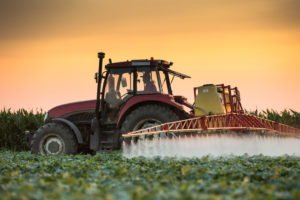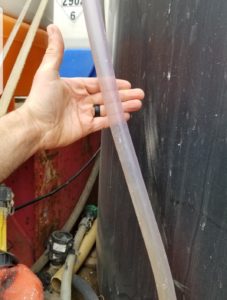Agriculture sprayers are used to bring out pesticide, weed killer or fertilizer on a field. A sprayer consists basically of a tank, a pump, a pipe and spray nozzles. The pump is either mechanical – as used in most backpack sprayers used in the garden – or electrical. For the big sprayers used in agriculture, electrical pumps are used. Pipes or hoses connect the spray tank with the nozzles.
Water quality is a crucial factor for spraying

Many farmers are using well water on their farm. Often this well water has not the best quality. For an ideal effect, soft water should be used when using pesticides. The chemicals are fully solved and are most efficient when using soft water. While this might be possible in private gardens, it is not an option for most farmers. Water softeners are costly to operate and buying soft water is also expensive. Therefore farmers use the water they get from their wells.
This makes dosing of pesticides difficult because of the high value of TDS. In order to be safe and kill all the weed, farmers often overdose. Which is not only costly but also harmful for the floor in which the chemicals sediment.
Furthermore, hard water or a high value of TDS can lead to problems in pumps, valves or the spray nozzles. The solved solids such as limescale can settle in the system and block for example nozzles. When blocked, these must be either cleaned or replaced.
Pesticide fully solved – very good weed kill rates
If the water quality in terms of TDS cannot be improved easily another factor needs to be adjusted. We, therefore, install Merus Rings which improve the solubility of the pesticide in the water. The water behaves like soft water despite nothing has been changed chemically. The experience we made with our customers is, that after the installation of one or several Merus Rings, the weed kill improved.
A farm in Saskatchewan in Canada serves as a representative for many farmers. The farm has 16,000 acres of land and used approx. 600,000 gallons of water from January until mid-July. A well is feeding two holding tanks with freshwater in which algae starts growing, as soon as the weather and water get warmer. To protect the water system, the tanks needs to be cleaned manually every two weeks.
The sprayers using this water didn’t produce constant results. One reason is, that the quality of the well water changes with the weather – depending on the amount of rain. With the water changing, it is rather complex to calculate the correct dosing of the pesticides. Therefore the results of the weed kill change with the water quality.
In this case, we decided to install three Merus Rings to tackle this major problem on the farm. We installed one Merus Ring ahead of the storage tanks and added one Merus Ring ahead of each sprayer.
Results on sprayers at the farm

Positive results were reported not only by the farmer we are working with. But also farmhands and other employees working around the farm observed significant changes (described below). As the only part in the process that changed is the Merus Ring, it is likely that the changes are initiated by our water treatment. It is too early in the year to predict the impact the improved spraying has on the growth of the crop. We will keep monitoring this case and update this page after we get these results.
What was observed in the first 6 months after the installation:
-
-
-
- The spray emerges now evenly from all nozzles.
- Pesticides previously sedimented in the booms of the sprayer are dissolved again and washed out of the sprayer.
- With the same weed kill program as before, weed kill rates are now excellent.
- No algae growth in the storage tanks anymore. As the Merus Rings removed the biofilm, the algae are gone as well.
- No mechanical cleaning of the tanks required.
- At the outer side of the tank, there is a sight gauge hose, as seen on the photo left. Before, in less than 6 weeks, the water got brown and black from the iron and the algae. Now the hose is still clean and transparent.
-
-
To what extent can the spraying be improved?
As a next step, the farmer will reduce the dosage of the pesticide gradually. Therefore he will use different dosages of pesticides in different areas of the field. Thus, he can compare the results of the weed killing easily and find the perfect dosage for his conditions. He then can spray his whole field with this mixture.
What is clear is that the worse the quality of the water the larger the scale for improvements. In cases where the water is soft, the results with a Merus Ring can not be as significant as in areas with very hard water.
Nevertheless reducing pesticides is not only good in economic terms but also ecological. Once we have collected enough data our engineers are able to calculate the impact of the Merus Water Treatment on CO2 emissions and thus the ecological footprint.
The farmer has agreed to give all colleagues information, on what he did and what he found. Please contact at info@merus.de and we forward the mobile number to you.
What works on a field will work in a garden as well

A garden sprayer has the same problem, with the dosing of the chemicals. Of course a lot of garden sprayers are used in places where people have access to treated city water. There, the hardness is not as high as in a well on a farm, but still there is room for improvement.
People who grow their own vegetables or fruit in their garden don’t like overdosing either. For they will eat what they harvest and not like their food, which is contaminated with chemicals.
